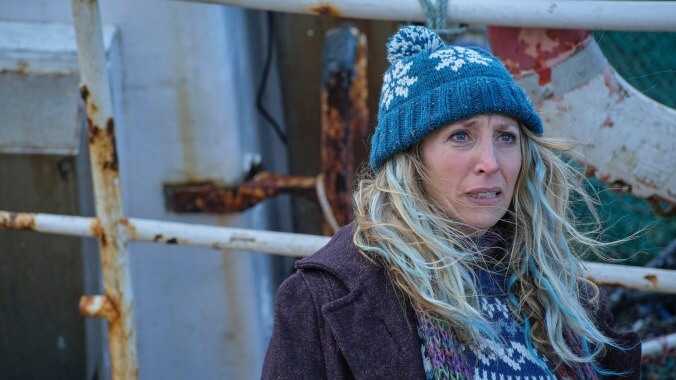Boat Story is a very gory, very meta, very fun black comedy
The clever British series, now on Freevee, is as much about thrills as the art of storytelling itself

The first three scenes of Boat Story, a stylish British show that aired on BBC One last year and made it to Freevee in the States last month, feature the following payoffs: a severed head being discovered in an abandoned field; a hand getting crushed in a factory, complete with thick blood slowly oozing down rusty metal machinery; and a fatal knife fight on the high seas in the midst of a storm that ends with the upbeat sounds of Sacha Distel’s “Quand on a le cœur tranquille.” And by the time this particularly twisty boat story ends, we’ve witnessed bodies strung up and treated like human piñatas, a tongue cut out, a head bashed in with a hammer, and many, many gun-downed police officers.
So, is it ridiculously bloody? Absolutely. And yet, Boat Story’s biggest trick—not a particularly new trick but one that’s nonetheless tough to pull off let alone keep up over six hourlong episodes—is how it wraps all that bloodshed and all of those twists in a nice cozy blanket, packing in cleverness, comedic beats, and even pathos as the body count keeps rising.
But first, before we get too far: This story, like most good crime stories, starts incredibly simply, with two complete strangers finding a boat carrying raw cocaine washed up on the beach. Regular folks stumbling onto loot then getting in way over their heads when the criminals who own said loot come calling is a well-worn, effective setup and one we’ve seen plenty, in everything from the Coen brothers’ No Country For Old Men to Dumb And Dumber.
The regular folks here are Janet (Daisy Haggard, who finished a fantastic four-season run on FX’s Breeders last year and showcases a similar comedic charm in this) and Samuel (Paterson Joseph, perhaps best known by many reading this as Mark’s weird boss in the aughts British comedy staple Peep Show). After some convincing from Samuel, Janet agrees to try to sell off the coke to a wholesale buyer. He needs the money because he gambled his family’s savings away, hence the recent move from London to a seaside town Daisy describes as “the country’s hairiest asshole.” (Samuel retorts, thoughtfully, that “it’s people that make a place,” to which Daisy counters, “Then we’re really fucked.”) Daisy wants enough scratch to pay off her dickhead Born-Again Christian of an ex-husband so she can become the legal guardian of his son.
Soon enough, and after a particularly drunken celebratory karaoke session and heart-to-heart, they’re pulled into the worlds of non-regular folks—namely, a coked-up local dealer (Adam Gillen), the guy behind those aforementioned human-piñatas who wouldn’t be out of place as an extra in Green Room, as well as a suave Frenchman (and owner of all of that raw coke) who is known, simply, as “The Tailor” (Tchéky Karyo). Meanwhile, a local baker (The Thick Of It’s Joanna Scanlan), her bumbling police officer son (Ethan Lawrence, offering sweet bits of comic relief), and the Tailor’s stone-faced henchman (Craig Fairbrass) are thrown into the mix, helping make Boat Story a decidedly offbeat cat-and-mouse game.
Smartly, brothers Harry and Jack Williams (creators of The Tourist), who wrote and directed each episode, drive home how every character—the regular folks, the criminals, the side personalities that on lesser shows would be one-dimensional detours from the A plot—is facing a crossroads and trying to turn over a new leaf: The psychopathic Tailor falls hard for that local baker and is set on giving love a go; the henchman is sick of the whole murdering people thing and wants to devote the rest of his life to his true passion, pottery; and the smiley policeman hopes to solve this international case and shake off his laughingstock reputation.
Equally cleverly, the show puts just as much emphasis on deploying its how-will-they-get-out-of-this-one thrills as amusingly picking apart the very nature of storytelling itself. Ólafur Darri Ólafsson’s baritone narration winks and guides us through what it all means, often over chapter cards that feel part silent-film, part Wes Anderson. And our story is told through various mediums—a black-and-white French film, a terrible play (Samuel sold away the rights of this very story to an imprisoned former client/aspiring dramatist to get a dealer hookup)—and timelines, even opening up by underlining the point, in text and voiceover, that “some prologues use epilogues.”
Is it a lot to take in? Yes. Does it make for a tidy finale that completely lands tonally? Not quite, no. And does it occasionally come off as a tad too clever? Sure. But Boat Story is mostly a delight, a crime caper bursting with energy, style, and ambition that sits firmly in the “fun watch” end of the TV landscape in spite of all the bloodshed. And we’d take another story like it any day.